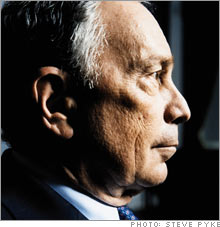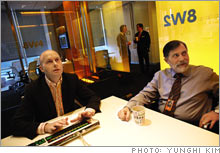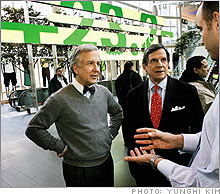Bloomberg's money machineThere's power in that name. The man, Michael Bloomberg, runs New York City and may have even grander ambitions. The company, Bloomberg LP, is a prodigious success and just keeps getting stronger.(Fortune Magazine) -- After he had been ignominiously fired from a firm he loved, started a financial-information company that almost no one thought had a chance - and then triumphantly watched it change the landscape of Wall Street - Michael Bloomberg forecast how The New York Times would cover his death. His success, he said in 1998, flashing the ego that is one of his trademarks, ensured him "a long obituary." And that was before he was twice elected mayor of New York City, a job that he holds today and that has won him approval ratings George W. Bush would die for. Now, with Bloomberg's second term as mayor due to end in early 2010 and his 65th birthday just past, the question is what Mayor Mike will do next to embellish his obit.
One sure answer is philanthropy, for which he has both billions of dollars and a passion. But speculation has grown about another possible career path: a run for the presidency. In a recent conversation with Fortune, Bloomberg coyly volunteered the line, "... assuming I'm not living at 1600 Pennsylvania Avenue." In the next breath he waved that off as "not very likely." Even so, a man doesn't voice such a thought unless he's thinking he may run. We can't know, therefore, the final dimensions of this big life. But for the sake of competitive drama and the celebration of a unique business model, we can step back and take the measure of the money machine called Bloomberg LP, which stands as a monument to the founder's creativity and drive. Bloomberg LP is a private business, nearly 68 percent owned by Mike (which is what we'll usually call him to distinguish him from the enterprise). It is a Wall Street juggernaut that has pummeled competitors and changed the way financial information is provided to customers. The secret: a sharp focus on delivering an ever-improving product and backing it up with unremitting attention to customer service. The company has also been a mother lode for Mike. It gave him the wealth to run for mayor, would let him single-handedly fund a campaign for President if he chooses to run, and will pave his road to large-scale philanthropy. As mayor of New York, Mike Bloomberg doesn't officially run the company now, and he has said he won't return to it (though few think he has retired from masterminding its large decisions). Instead, it is in the hands of an intensely loyal and close friend, Peter Grauer, 61, a former Wall Streeter who serendipitously met Mike in the late 1980s when both were chauffeuring young daughters to equestrian shows and who became executive chairman of the company soon after Mike was elected. At Grauer's side at the top are three seasoned Bloombergers: Alexius "Lex" Fenwick, 48, a Briton whose title is CEO but who is really the company's operating head and chief salesman; Thomas Secunda, 52, who helped Mike start the company, owns some of its stock, and reigns as product guru; and Matthew Winkler, 51, who runs the company's extensive journalism operations. These four are noncelebrities in the business world, not well-known at all. Which hardly matters, because many, many thousands of people know - and loads are even addicted to - Bloombergs. There are 250,000 installations of this product around the world, for each of which customers typically pay $1,500 a month. On the floors of large financial institutions, there will usually be seas of Bloombergs, used for trading, research, investment banking, arbitrage, you name it. But they can turn up anywhere: on the desks of attorneys, in the homes of private investors, in the offices of central bankers - and certainly at City Hall in New York City. (Even a BlackBerry can access the product.) As a shortcut, customers and insiders often call installations simply "the Bloomberg" or a "terminal" - and for convenience, we will too. At its heart, though, the product has little to do with hard goods. Rather, it is a subscription service that sells financial data, analytic software to leverage the data's usefulness, trading tools and news (electronic, print, TV, radio). All of this is accessible through a color-coded Bloomberg keyboard that pops the desired information onto a computer screen, either your own or one Bloomberg provides. (You can also set up your computer to use the service without a Bloomberg keyboard.) The central fact about Bloomberg's new headquarters in midtown Manhattan is that it is nonhierarchical, having no private offices; all employees, from the brass on down, sit in long rows of terminal-laden desks. The surround is modern art, exotic flowers, 22 fish tanks filled with rare specimens and expanses of light and color. The company's international offices are high style too. All the spaces, says executive Fenwick, are "meant to dazzle." And the corporate culture is as distinctive as the décor. As the visuals suggest, Bloomberg LP is itself a specimen of wealth - though you couldn't prove that by the sparse financial data it releases. Mike Bloomberg didn't help the flow of information by turning down Fortune's request for a face-to-face interview, talking for only about ten minutes on the phone. His company, however, not only made its top people available for long interviews but also supplied Fortune with a string of revenue figures that it has never before made public. These numbers go nowhere but up and for 2006 show approximately $4.7 billion in revenues. That would place the company at about No. 475 on the Fortune 500, not bad for an operation that got started only 25 years ago. Beyond that, Bloomberg LP is smashingly profitable. Fortune's estimate, derived from many interviews outside the company as well as in, is that the company's 2006 operating profits (that is, before taxes) were about $1.5 billion. That put the company's operating margin a bit above 30 percent of revenues. That margin doesn't match Microsoft's (Charts) (about 37 percent), but it is way above Apple's (Charts), which has been running under 15 percent. And none of Bloomberg's most visible competitors in financial information - Dow Jones (Charts), Reuters (Charts), and the Thomson Financial unit of Thomson Corp (Charts). - have operating margins that reach 20 percent. Mike Bloomberg is enormously and justifiably proud of Bloomberg LP. He nonetheless recently considered selling it. A sale, of course, would sweep in the other shareholders, who include (a) a few people who started the company with Mike and (b) Merrill Lynch, which helped finance it along the way and owns 20 percent of it (a large fact that goes completely unmentioned in Merrill's financial statements). But having tight control, Mike engaged last year in small discussions with at least a few possible buyers. Among them were private-equity firms that are rolling in cash and would no doubt kill to get hold of this property. However, the proprietor emerged from his excursion deciding not to sell just now, giving no further explanation. The news sent waves of jubilation through the company's offices, since few think another owner could match Mike. In particular, the television staff at Bloomberg - 650 people - breathed sighs of relief, because the perception is that new private-equity owners would immediately cut expenses by exiting the costly TV business. Mike Bloomberg, on the other hand, has always thought TV good for the Bloomberg brand. In any case, there is a pointed question to be asked of Mike about his sale explorations, and Fortune asked it in a phone conversation with him in January: "Considering how proud you are of this company, could you really sell it to a private-equity firm?" And he answered, "No, I couldn't." All that noted, we can estimate what Bloomberg LP might bring in a sale. Assuming operating profits are indeed $1.5 billion, and assuming also that terminal sales will keep rising - there was a gain of 26,000 in 2006 - a price of $20 billion might be not only possible but close to a floor. Amounts above that seem entirely feasible. And even at $20 billion, Mike Bloomberg's stake would be worth more than $13 billion - which is a far sight above the $5.5 billion that Forbes has just accorded the mayor in its billionaires' list. (To give credit where it's due, both CNBC and a New York City newspaper, The Sun, pointed out last fall - obviously to no avail - that Forbes has been underestimating Mike Bloomberg's wealth.) |
Sponsors
|



